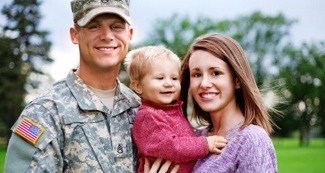Deployment and Spouses

Being the spouse of deployed military personnel can be a challenge. Although you may have finally adjusted to life without your spouse being around, you are probably feeling very excited, anxious, and a bit stressed out now that they are returning home. There is nothing wrong with your feelings, in fact, they are very normal. There are some things that you can do to make this transition as seamless as possible for both you and your spouse.
What You Should Expect
Remember, you and your spouse may be feeling a bit ambivalent about their return home. Relax, it is normal, and it doesn’t take away from the fact that you are both extremely happy to see each other. Homecoming day is going to be stressful no matter how prepared you feel you are for it. Keep things simple to reduce stress and awkward situations.
You may also be feeling optimistic, which is perfectly fine. However, you need to keep your head out of the clouds. The fewer expectations you have, the better. You and your spouse may feel a bit out of sync with each other initially, but you need to keep in mind that your spouse has lived a drastically different life than you have while they were deployed and may have changed. Once home, give your spouse time to rest and relax over their first few weeks back. They need time to recover from traveling such a long distance back and to readjust to life at home.
Communication
Even if your spouse doesn’t seem to be very talkative, it is very important for you to communicate with them. Talk to your spouse and tell them how you feel. Be honest with them and encourage them to respond back to you. Ask them how they feel and listen to them. Establishing and maintaining the lines of communication will help you and your spouse to become closer and close the distance that grew between you during their time away.
Reintegrate Them Back Into the Routine
As your spouse starts to become more familiar with the routine that you established while they were away, expect for there to be some discussions and disagreements. Your spouse may question you or make remarks about the way that you do things; this is to be expected. Avoid being on the defensive and be prepared to explain to your spouse why you changed your family’s routine. Don’t be afraid to stress the fact that things weren’t the same when they left. Also, after each discussion don’t hesitate to let them know that you are happy that they are home and would love to reestablish a routine that involves them and that you want to discuss all problems cordially and calmly.
You may feel that it is pretty evident that you are happy for your spouse to be home and that they should be able to tell how you feel, but you need to remember that your spouse is a different person than who they were before they were deployed. Your spouse will need constant reassurance that they are wanted, needed and appreciated. No matter how busy you may get, don’t forget to spend a little extra time with them and tell them how much you care.
Related products you may like:
Testimonials:
-
I received my United States MA-1 Bravo Jacket yesterday and I am very pleased with it. Thanks
Charles W
-
Thank you very much for the two beautiful garments! Both the MA1-Bravo Jacket and the Concealed Carry Soft Shell Vest fit perfectly and are tailored to perfection. They are rugged and warm, exactly what I was looking for.
Ed J.
-
I received the jacket this past Wednesday. I just love it. Good quality, feels great, and looks sharp. I have been looking for such a jacket the past few years and have finally found it.
Edward A.
-
Dear Vetcom, Received the MA-1 Bravo Jacket yesterday. Thank you so very much, made a Veteran very happy. Was so hoping to have it on time for him to wear on Veterans Day and you made sure it was here in time. The jacket is beautiful and my husband just loves it. Again, thank you so very much and God bless.
Jessie H.





